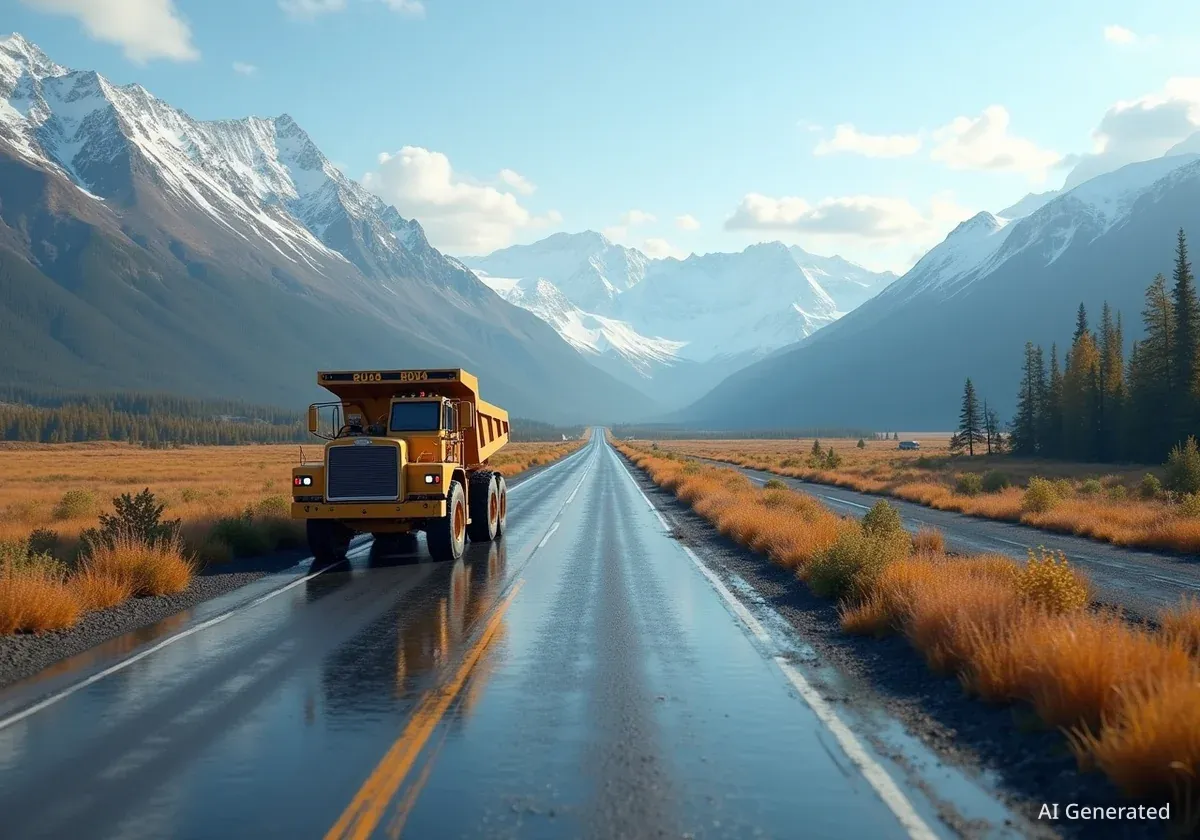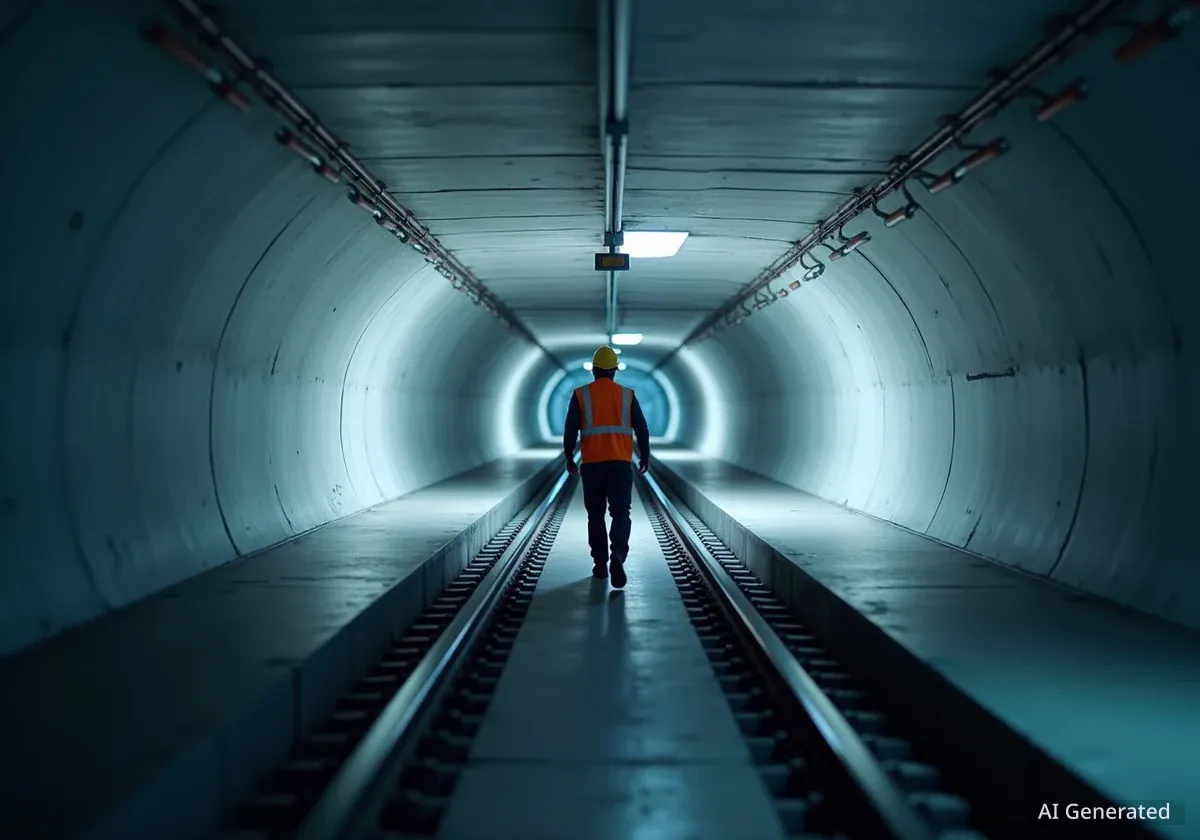The U.S. administration has approved the construction of a 211-mile industrial road through a remote part of Alaska, including a section of the Gates of the Arctic National Park. Officials state the project is necessary to access critical minerals, particularly copper, to support the nation's growing artificial intelligence industry and compete with China.
The decision, announced on Monday, reverses a 2024 rejection of the Ambler Road Project by the previous administration, which had cited significant environmental and cultural concerns.
Key Takeaways
- The Trump administration approved the 211-mile Ambler Road Project in Alaska on October 8, 2025.
- The road will facilitate access to the Ambler Mining District, which holds deposits of copper, zinc, gold, and other minerals valued at over $7 billion.
- Officials have explicitly linked the project to the need for copper to power and cool AI data centers, framing it as part of an "AI arms race" with China.
- The project reverses a 2024 decision by the Bureau of Land Management to block the road due to environmental risks and impacts on Alaska Native communities.
- Construction is set to begin in spring 2026, with an accelerated timeline aiming for completion in under one year.
Project Approval and Strategic Justification
On Monday, President Donald Trump formally approved the Ambler Road Project, a significant infrastructure undertaking in northern Alaska. The decision was announced from the Oval Office, with Interior Secretary Doug Burgum and Energy Secretary Chris Wright present. The administration's primary justification for the project is to secure a domestic supply of minerals essential for high-tech industries.
Secretary Burgum highlighted the strategic importance of the resources located in the Ambler Mining District. "These are minerals that are absolutely essential to defense, to industry," Burgum stated. He emphasized the region's copper deposits, noting their critical role in the development of artificial intelligence.
Copper is a key component in the massive data centers required to run AI applications, as it is highly effective for electrical conductivity and cooling systems. The global demand for copper is projected to significantly outpace supply in the coming years, with a 2025 report forecasting a 30% supply shortfall by 2035.
Mineral Dependency
According to Interior Secretary Doug Burgum, China currently controls between 85% and 100% of the mining and refining of the top 20 critical minerals. The Ambler district contains not only copper but also lead, zinc, gold, silver, gallium, and germanium.
The administration has framed the project as a matter of national security and economic competition. "We got copper, lead, zinc, gold, silver, gallium, germanium — rich in all of the minerals that we need to win the AI arms race against China," Burgum said. President Trump echoed this sentiment, stating the project would "unleash billions and billions of dollars in wealth" needed for the U.S. to remain a global leader.
Reversal of Previous Environmental Decisions
The approval marks a sharp reversal of the federal government's previous stance. In 2024, the Bureau of Land Management (BLM), in cooperation with Alaska tribal councils and the Environmental Protection Agency, issued a Record of Decision selecting the "No Action" alternative for the Ambler Road. That decision was based on extensive findings of potential harm.
The BLM report cited numerous risks, including damage to fish habitats, degradation of water and air quality, and disruption of groundwater flow. A significant concern was the project's impact on the Western Arctic caribou herd, whose population has been in steady decline since 2017. The road's path would cut through the herd's migratory routes.
Furthermore, the 2024 decision concluded that the road would cause irreversible harm to the culture and traditional subsistence practices of Alaska Native communities who have inhabited the region for centuries. The project was formally denied by the Biden administration on June 28, 2024, before being revived through a direct appeal to President Trump by the Alaska Industrial Development and Export Authority.
Broader Policy on Federal Lands
This decision aligns with other recent policy shifts by the administration. In March 2025, President Trump signed an executive order to increase domestic mineral production. The administration has also announced plans to rescind the 2001 Roadless Area Conservation Rule, which would open approximately 45 million acres of national forest land to road construction and logging.
Construction Details and Accelerated Timeline
The Ambler Road is planned to be a 211-mile private industrial access road. It will begin near the towns of Wiseman and Coldfoot on the Dalton Highway and extend west to the Ambler Mining District. The construction will be a major engineering challenge.
The proposed route crosses more than 3,000 streams and several major rivers, requiring the construction of up to 50 bridges. The project also includes plans for aid stations, airstrips, turnouts, and numerous culverts. A significant portion of the road, approximately 26 miles, will pass through the Gates of the Arctic National Park and Preserve.
"We build a road that’s over 200 miles long through a very beautiful area of the world. It’s incredible when you look at it. But a rough area from the standpoint of building," President Trump told reporters.
The timeline for the project has been drastically shortened. While such projects typically take several years, Secretary Burgum announced that planning will occur throughout the winter, with construction starting in the spring of 2026. President Trump added, "We’ll get it done in less than a year."
As part of the deal, the U.S. government and the Department of War will acquire a 10% stake in Trilogy Metals, a Canadian mining company with significant claims in the Ambler region.
Opposition and Cultural Concerns
The decision has drawn immediate condemnation from environmental organizations and some political leaders. Critics argue that the administration is prioritizing corporate profits over environmental protection and the rights of Indigenous peoples.
Representative Jared Huffman of California, the ranking member of the House Natural Resources Committee, criticized the move. "As with every other shortsighted, self-serving decision by this administration, this move is silencing the people who will be impacted the most," Huffman said. "Trump is sidestepping the views of Native Alaskans and short circuiting the federal government’s obligation to hear from them."
The project draws parallels to other controversial resource extraction projects on lands considered sacred by Native American tribes. For example, the administration recently fast-tracked the transfer of Oak Flat in Arizona, a sacred Apache site, to a copper mining company. The Supreme Court declined to hear a case brought by the Apache Stronghold to halt that transfer on October 6, 2025.
Advocacy groups fear the Ambler Road will set a dangerous precedent for industrial development in one of the country's last great wilderness areas, permanently altering a fragile ecosystem and the communities that depend on it.





